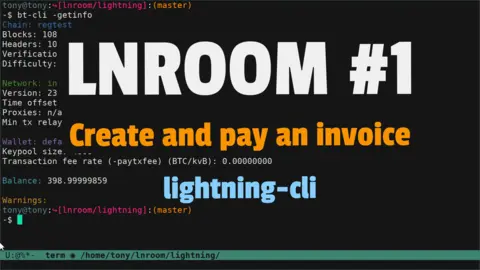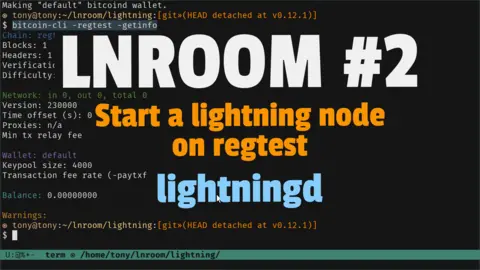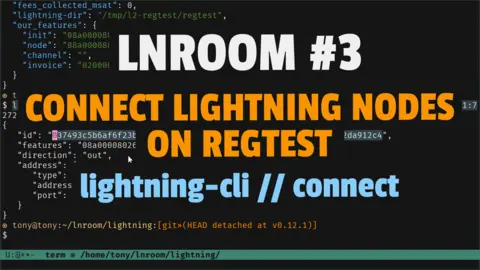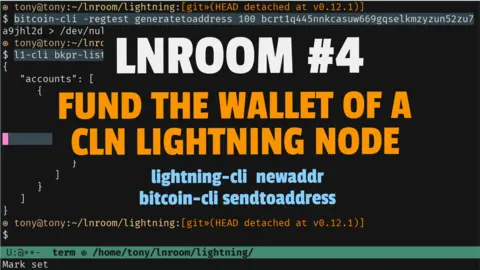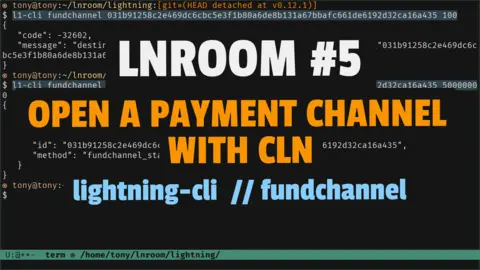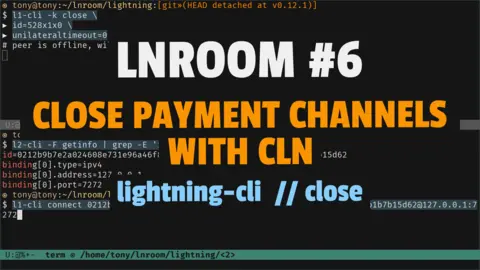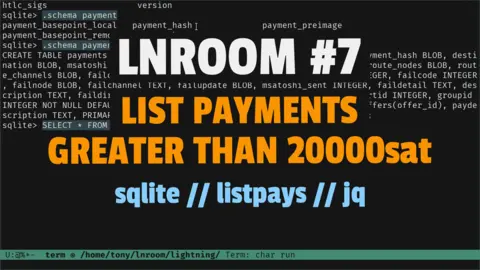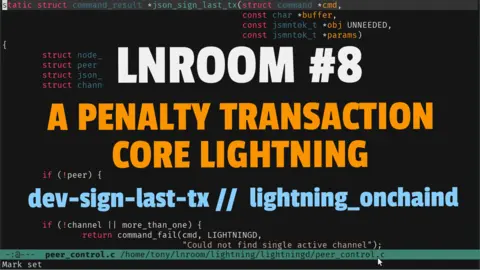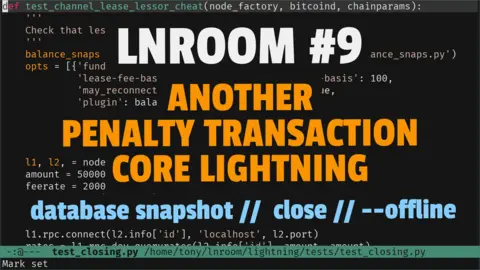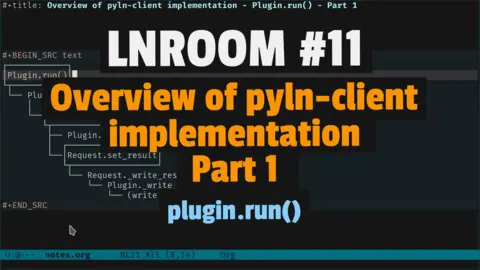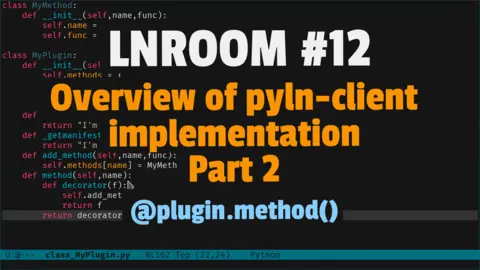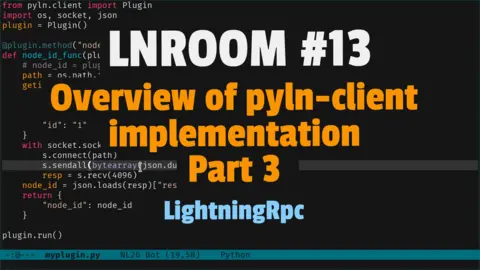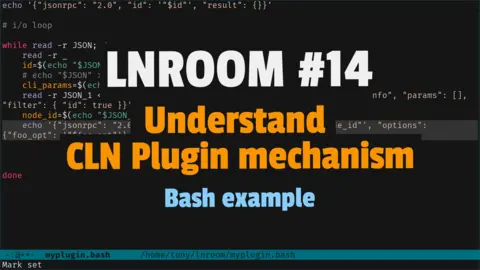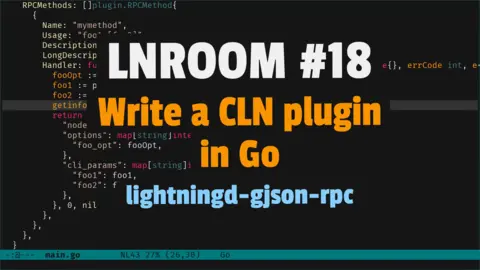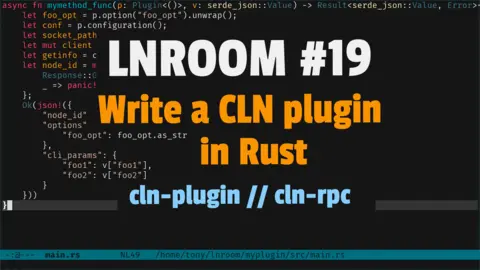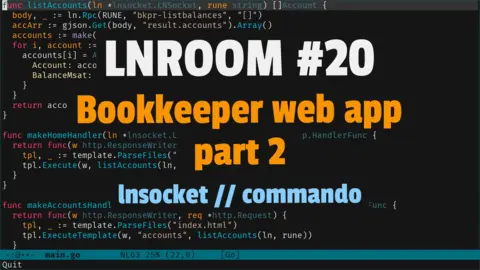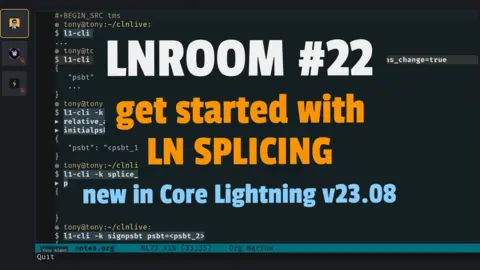Core Lightning implementation of BOLT #11 invoices - part 5
In this recording, we implement some functions that let us encode the string foo bar (the description of a BOLT #11 invoice) into its bech32 representation vehk7grzv9eq.
Transcript with corrections and improvements
Hi everybody, I hope you're doing well, this video contains the content I wanted to show you during the live session that we were unable to do today. We tried with Drew to start the session on CLN community platform but it didn't work today.
Anyway, I will record that video as if it was a live, meaning that if I make mistakes I will continue with those mistakes and don't restart the recording to make it cleaner.
This is the part 5 of a series on BOLT #11 invoices implementation in
Core Lightning. This is super facinating and we are at the point where
we are going to implement the encoding of the string foo bar
(description of an invoice) into the string vehk7grzv9eq, its bech32
representation.
We saw in that section of the last live session how BOLT #11 spec tells us to implement it, and today we'll implement it.
ccan dependencies
We are going to write our project in the subdirectory bech32 that
already contains the file bech32.c we are going to work on today and a
Makefile to compile it with its ccan dependencies.
Specifically, our project depends on ccan/tal and ccan/short_types
that we can get from rustyrussell/ccan repository.
To get those dependencies we clone rustyrussell/ccan repository and
run make:
◉ tony@tony:~/clnlive/ccan:[git»master]
$ git clone https://github.com/rustyrussell/ccan
◉ tony@tony:~/clnlive/ccan:[git»master]
$ makeThis created a config.h file that we need in our project to get ccan
dependencies to compile. So we copy it like this:
◉ tony@tony:~/clnlive/ccan:[git»master]
$ cp config.h ../bech32/Then we use ./tools/create-ccan-tree to create tal and short_types
dependencies into a subdirectory called ccan under our project bech32:
◉ tony@tony:~/clnlive/ccan:[git»master]
$ ./tools/create-ccan-tree ../bech32/ccan/ tal short_types
Building ccan_depends, modfiles
Cleaning source tree
Adding ccan/alignof
Adding ccan/build_assert
Adding ccan/check_type
Adding ccan/compiler
Adding ccan/container_of
Adding ccan/hash
Adding ccan/htable
Adding ccan/likely
Adding ccan/list
Adding ccan/short_types
Adding ccan/str
Adding ccan/take
Adding ccan/tal
Adding ccan/typesafe_cb
Adding licenses
Adding build infrastructure
Done. ccan source tree built in ../bech32/ccan/Now, we can go in our project and check the state of our project:
◉ tony@tony:~/clnlive/bech32:[git»master]
$ tree -L 3 .
.
├── bech32.c
├── ccan
│ ├── ccan
│ │ ├── alignof
│ │ ├── build_assert
│ │ ├── check_type
│ │ ├── compiler
│ │ ├── container_of
│ │ ├── hash
│ │ ├── htable
│ │ ├── likely
│ │ ├── list
│ │ ├── short_types
│ │ ├── str
│ │ ├── take
│ │ ├── tal
│ │ └── typesafe_cb
│ └── licenses
│ ├── BSD-MIT
│ ├── CC0
│ └── LGPL-2.1
├── compile_commands.json
├── config.h
└── Makefile
17 directories, 7 filesNote that compile_commands.json is intended for my editor for code
completion and the like.
Get started
Note that the following examples doesn't include the #include ...
statements. To know what they are check bech32.c section.
In the file bech32.c, we start with the following program
int main () {
printf("foo");
}that we compile and run like this:
◉ tony@tony:~/clnlive/bech32:[git»master]
$ make
◉ tony@tony:~/clnlive/bech32:[git»master]
$ ./bech32
fooGet the bits of a character
In that section we are trying to see how we can get the bits defining a character.
For instance, the ascii character c (102 in decimal) is [01100110] in
binary notation with 8 bits.
How can we get those bits?
We can get those bits by using the shift (left to right) operator >>
to push any bit from the left to the last position on the right and
finally get that bit by using the & operator combined with the number
1 as right operand.
Let's look at some examples to understand how >> and & operators
behave.
%c vs. %i
The following program
int main () {
printf("%c\n", 'f');
printf("%i", 'f');
}gives us:
◉ tony@tony:~/clnlive/bech32:[git»master]
$ make
◉ tony@tony:~/clnlive/bech32:[git»master]
$ ./bech32
f
102& operator
The following program
int main () {
printf("%i\n", 0 & 1);
printf("%i\n", 1 & 1);
printf("%i\n", 2 & 1);
printf("%i", 3 & 1);
}gives us:
◉ tony@tony:~/clnlive/bech32:[git»master]
$ make
◉ tony@tony:~/clnlive/bech32:[git»master]
$ ./bech32
0
1
0
1>> operator
The following program
// 1 <-> 001
// 2 <-> 010
// 4 <-> 100
int main () {
printf("%i\n", (1 >> 1));
printf("%i\n", (2 >> 1));
printf("%i\n", (4 >> 1));
printf("--\n");
printf("%i\n", (1 >> 2));
printf("%i\n", (2 >> 2));
printf("%i\n", (4 >> 2));
printf("--\n");
printf("%i\n", (1 >> 3));
printf("%i\n", (2 >> 3));
printf("%i", (4 >> 3));
}gives us:
◉ tony@tony:~/clnlive/bech32:[git»master]
$ make
◉ tony@tony:~/clnlive/bech32:[git»master]
$ ./bech32
0
1
2
--
0
0
1
--
0
0
0Combining >> and & operator to get bits of a number
The following program
// 1 <-> 001
// 2 <-> 010
// 4 <-> 100
int main () {
printf("%i\n", (1 >> 0) & 1);
printf("%i\n", (2 >> 0) & 1);
printf("%i\n", (4 >> 0) & 1);
printf("--\n");
printf("%i\n", (1 >> 1) & 1);
printf("%i\n", (2 >> 1) & 1);
printf("%i\n", (4 >> 1) & 1);
printf("--\n");
printf("%i\n", (1 >> 2) & 1);
printf("%i\n", (2 >> 2) & 1);
printf("%i", (4 >> 2) & 1);
}gives us:
◉ tony@tony:~/clnlive/bech32:[git»master]
$ make
◉ tony@tony:~/clnlive/bech32:[git»master]
$ ./bech32
1
0
0
--
0
1
0
--
0
0
1The following program
// o <-> 111 (decimal) <-> 01101111
int main () {
for (size_t i=0; i < 8; i++){
printf("%i", (111 >> i) & 1);
}
printf("\n--------\n");
for (size_t i=0; i < 8; i++) {
printf("%i", (111 >> (7 - i) & 1));
}
}gives us:
◉ tony@tony:~/clnlive/bech32:[git»master]
$ ./bech32
11110110
--------
01101111Now we can extract some code and put it in a function that we call
get_bit_of_char like this:
static u8 get_bit_of_char(const u8 c, size_t bit)
{
return (c >> (7 - bit)) & 1;
}
int main () {
for (size_t i=0; i < 8; i++){
printf("%i", get_bit_of_char(111, i));
}
}This gives us the following:
◉ tony@tony:~/clnlive/bech32:[git»master]
$ make
◉ tony@tony:~/clnlive/bech32:[git»master]
$ ./bech32
01101111Create 5 bits bytes characters from 8 bit bytes characters
In the previous section, we saw how to get the individual bits of a character. Now we need to group those bits by 5.
The following program takes the first 5 bits of the number 111 (ascii
character o) and prints them enclosed by [...] and then takes the last
3 bits of the same number, prints them and prints two 0s (the padding),
everything enclosed by [...]:
static u8 get_bit_of_char(const u8 c, size_t bit)
{
return (c >> (7 - bit)) & 1;
}
int main () {
size_t i, b;
for (i=0; i < 8; i +=b){
printf("[");
for (b=0; b < 5; b++){
if ((i + b) < 8)
printf("%i", get_bit_of_char(111, i+b));
else
printf("0");
}
printf("]");
}
}This gives:
◉ tony@tony:~/clnlive/bech32:[git»master]
$ make
◉ tony@tony:~/clnlive/bech32:[git»master]
$ ./bech32
[01101][11100]Now we do something similar but for the string "fo" (the numbers 102
and 111) as follow:
static u8 get_bit_of_char(const u8 c, size_t bit)
{
return (c >> (7 - bit)) & 1;
}
int main () {
size_t i, b;
u8 * src = "fo";
for (i=0; i < 16; i +=b){
printf("[");
for (b=0; b < 5; b++){
if ((i + b) < 16)
printf("%i", get_bit_of_char(src[(i+b) / 8], (i+b) % 8));
else
printf("0");
}
printf("]");
}
}This gives us:
◉ tony@tony:~/clnlive/bech32:[git»master]
$ make
◉ tony@tony:~/clnlive/bech32:[git»master]
$ ./bech32
[01100][11001][10111][10000]So far, we've only printed bits in groups of five. Now, we want number (from 0 to 31 included) represented by those groups of 5 bits.
To do so we'll use the shift (right to left) operator << and the
'inclusive or' | operator. Specifically, each bit received from the 8
bits bytes is stored in a variable as the last bit (on the right) of
the value held by the variable. In order, to get the number we are
looking for, before storing that bit, we first shift by one from the
right to the left the number held in that variable. Each time, we
do that process for 5 bits we reset the variable to zero:
typedef unsigned char u5;
static u8 get_bit(const u8 *src, size_t bit)
{
return (src[(bit / 8)] >> (7 - (bit % 8))) & 1;
}
int main () {
size_t i, b;
u8 * src = "fo";
u5 u5_char;
for (i=0; i < 16; i +=b){
u5_char = 0;
for (b=0; b < 5; b++){
u5_char <<= 1;
if ((i + b) < 16)
u5_char |= get_bit(src, i+b);
}
printf("%i\n", u5_char);
}
}This gives us:
◉ tony@tony:~/clnlive/bech32:[git»master]
$ make
◉ tony@tony:~/clnlive/bech32:[git»master]
$ ./bech32
12
25
23
16Now instead of erasing the variable u5_char for each new five bits, we
store each new five bits in another cell of an array:
typedef unsigned char u5;
static u8 get_bit(const u8 *src, size_t bit)
{
return (src[(bit / 8)] >> (7 - (bit % 8))) & 1;
}
int main () {
size_t i, b;
u8 * src = "fo";
u5 * u5data = tal_arr(NULL, u5, 0);
size_t u5data_len = 0;
for (i=0; i < 16; i +=b){
tal_resize(&u5data, u5data_len + 1);
u5data[u5data_len] = 0;
for (b=0; b < 5; b++){
u5data[u5data_len] <<= 1;
if ((i + b) < 16)
u5data[u5data_len] |= get_bit(src, i+b);
}
u5data_len++;
}
for (i=0; i < tal_count(u5data); i++) {
printf("%i\n", u5data[i]);
}
}This gives us:
◉ tony@tony:~/clnlive/bech32:[git»master]
$ make
◉ tony@tony:~/clnlive/bech32:[git»master]
$ ./bech32
12
25
23
16This is the time now to extract some code and to put it in a function
that we call u8_to_u5 like this:
typedef unsigned char u5;
static u8 get_bit(const u8 *src, size_t bit)
{
return (src[(bit / 8)] >> (7 - (bit % 8))) & 1;
}
u5 *u8_to_u5(const u8 *src, size_t nbits)
{
size_t i, b;
u5 * u5data = tal_arr(NULL, u5, 0);
size_t u5data_len = 0;
for (i=0; i < nbits; i +=b){
tal_resize(&u5data, u5data_len + 1);
u5data[u5data_len] = 0;
for (b=0; b < 5; b++){
u5data[u5data_len] <<= 1;
if ((i + b) < nbits)
u5data[u5data_len] |= get_bit(src, i+b);
}
u5data_len++;
}
return u5data;
}
int main () {
u8 * src = "foo bar";
u5 * data = u8_to_u5(src, 56);
for (size_t i=0; i < tal_count(data); i++) {
printf("%i\n", data[i]);
}
tal_free(data);
}This gives us:
◉ tony@tony:~/clnlive/bech32:[git»master]
$ make
◉ tony@tony:~/clnlive/bech32:[git»master]
$ ./bech32
12
25
23
22
30
8
3
2
12
5
25
0Finally, we can encode those numbers using bech32 char set like this:
#include <stddef.h>
#include <stdio.h>
#include <ccan/tal/tal.h>
#include <ccan/short_types/short_types.h>
/* Type to annotate a 5 bit value. */
typedef unsigned char u5;
const char bech32_charset[] = "qpzry9x8gf2tvdw0s3jn54khce6mua7l";
static u8 get_bit_of_char(const u8 c, size_t bit)
{
return (c >> (7 - bit)) & 1;
}
static u8 get_bit(const u8 *src, size_t bit)
{
return (src[(bit / 8)] >> (7 - (bit % 8))) & 1;
}
u5 *u8_to_u5(const u8 *src, size_t nbits)
{
size_t i, b;
u5 * u5data = tal_arr(NULL, u5, 0);
size_t u5data_len = 0;
for (i=0; i < nbits; i +=b){
tal_resize(&u5data, u5data_len + 1);
u5data[u5data_len] = 0;
for (b=0; b < 5; b++){
u5data[u5data_len] <<= 1;
if ((i + b) < nbits)
u5data[u5data_len] |= get_bit(src, i+b);
}
u5data_len++;
}
return u5data;
}
int main () {
u8 * src = "foo bar";
u5 * data = u8_to_u5(src, 56);
for (size_t i=0; i < tal_count(data); i++) {
printf("%2i -> %c\n", data[i], bech32_charset[data[i]]);
}
tal_free(data);
}This gives us:
◉ tony@tony:~/clnlive/bech32:[git»master]
$ make
◉ tony@tony:~/clnlive/bech32:[git»master]
$ ./bech32
12 -> v
25 -> e
23 -> h
22 -> k
30 -> 7
8 -> g
3 -> r
2 -> z
12 -> v
5 -> 9
25 -> e
0 -> qWe are DONE!
Terminal session
We ran the following commands in this order:
$ make
$ cp config.h ../bech32/
$ ./tools/create-ccan-tree
$ ./tools/create-ccan-tree ../bech32/ccan/ tal short_types
$ cd ../bech32/
$ tree -L 3 .
$ make
$ ./bech32And below you can read the terminal session (command lines and outputs):
◉ tony@tony:~/clnlive/ccan:[git»master]
$ make
...
◉ tony@tony:~/clnlive/ccan:[git»master]
$ cp config.h ../bech32/
◉ tony@tony:~/clnlive/ccan:[git»master]
$ ./tools/create-ccan-tree
Usage: create-ccan-tree [options] <outdir> <depends>...
options:
-a, --copy-all copy all files in module tree (not just sources
required for build)
-b, --build-type=TYPE generate build infrastructure of TYPE
(one of 'make', 'make+config', 'automake', 'waf')
◉ tony@tony:~/clnlive/ccan:[git»master]
$ ./tools/create-ccan-tree ../bech32/ccan/ tal short_types
Building ccan_depends, modfiles
Cleaning source tree
Adding ccan/alignof
Adding ccan/build_assert
Adding ccan/check_type
Adding ccan/compiler
Adding ccan/container_of
Adding ccan/hash
Adding ccan/htable
Adding ccan/likely
Adding ccan/list
Adding ccan/short_types
Adding ccan/str
Adding ccan/take
Adding ccan/tal
Adding ccan/typesafe_cb
Adding licenses
Adding build infrastructure
Done. ccan source tree built in ../bech32/ccan/
◉ tony@tony:~/clnlive/ccan:[git»master]
$ cd ../bech32/
◉ tony@tony:~/clnlive/bech32:[git»master]
$ tree -L 3 .
.
├── bech32.c
├── ccan
│ ├── ccan
│ │ ├── alignof
│ │ ├── build_assert
│ │ ├── check_type
│ │ ├── compiler
│ │ ├── container_of
│ │ ├── hash
│ │ ├── htable
│ │ ├── likely
│ │ ├── list
│ │ ├── short_types
│ │ ├── str
│ │ ├── take
│ │ ├── tal
│ │ └── typesafe_cb
│ └── licenses
│ ├── BSD-MIT
│ ├── CC0
│ └── LGPL-2.1
├── compile_commands.json
├── config.h
└── Makefile
17 directories, 7 files
◉ tony@tony:~/clnlive/bech32:[git»master]
$ make
◉ tony@tony:~/clnlive/bech32:[git»master]
$ ./bech32
foo
◉ tony@tony:~/clnlive/bech32:[git»master]
$ make
◉ tony@tony:~/clnlive/bech32:[git»master]
$ ./bech32
f
102
◉ tony@tony:~/clnlive/bech32:[git»master]
$ make
◉ tony@tony:~/clnlive/bech32:[git»master]
$ ./bech32
0
1
0
1
◉ tony@tony:~/clnlive/bech32:[git»master]
$ make
◉ tony@tony:~/clnlive/bech32:[git»master]
$ ./bech32
0
1
2
--
0
0
1
--
0
0
0
◉ tony@tony:~/clnlive/bech32:[git»master]
$ make
◉ tony@tony:~/clnlive/bech32:[git»master]
$ ./bech32
1
0
0
--
0
1
0
--
0
0
1
◉ tony@tony:~/clnlive/bech32:[git»master]
$ ./bech32
11110110
-------
01101111
◉ tony@tony:~/clnlive/bech32:[git»master]
$ make
◉ tony@tony:~/clnlive/bech32:[git»master]
$ ./bech32
01101111
◉ tony@tony:~/clnlive/bech32:[git»master]
$ make
◉ tony@tony:~/clnlive/bech32:[git»master]
$ ./bech32
[01101][11100]
◉ tony@tony:~/clnlive/bech32:[git»master]
$ make
◉ tony@tony:~/clnlive/bech32:[git»master]
$ ./bech32
[01100][11001][10111][10000]
◉ tony@tony:~/clnlive/bech32:[git»master]
$ make
◉ tony@tony:~/clnlive/bech32:[git»master]
$ ./bech32
12
25
23
16
◉ tony@tony:~/clnlive/bech32:[git»master]
$ make
◉ tony@tony:~/clnlive/bech32:[git»master]
$ ./bech32
12
25
23
16
◉ tony@tony:~/clnlive/bech32:[git»master]
$ make
◉ tony@tony:~/clnlive/bech32:[git»master]
$ ./bech32
12
25
23
22
30
8
3
2
12
5
25
0
◉ tony@tony:~/clnlive/bech32:[git»master]
$ make
◉ tony@tony:~/clnlive/bech32:[git»master]
$ ./bech32
12 -> v
25 -> e
23 -> h
22 -> k
30 -> 7
8 -> g
3 -> r
2 -> z
12 -> v
5 -> 9
25 -> e
0 -> qCore Lightning source code
common/bech32_util.c
lightning:common/bech32_util.c
#include "config.h"
#include <ccan/tal/str/str.h>
#include <common/bech32.h>
#include <common/bech32_util.h>
static u8 get_bit(const u8 *src, size_t bitoff)
{
return ((src[bitoff / 8] >> (7 - (bitoff % 8))) & 1);
}
void bech32_push_bits(u5 **data, const void *src, size_t nbits)
{
size_t i, b;
size_t data_len = tal_count(*data);
for (i = 0; i < nbits; i += b) {
tal_resize(data, data_len+1);
(*data)[data_len] = 0;
for (b = 0; b < 5; b++) {
(*data)[data_len] <<= 1;
/* If we need bits we don't have, zero */
if (i+b < nbits)
(*data)[data_len] |= get_bit(src, i+b);
}
data_len++;
}
}
static u8 get_u5_bit(const u5 *src, size_t bitoff)
{
return ((src[bitoff / 5] >> (4 - (bitoff % 5))) & 1);
}
void bech32_pull_bits(u8 **data, const u5 *src, size_t nbits)
{
size_t i;
size_t data_len = tal_count(*data);
/* We discard trailing bits. */
for (i = 0; i + 8 <= nbits; i += 8) {
tal_resize(data, data_len+1);
(*data)[data_len] = 0;
for (size_t b = 0; b < 8; b++) {
(*data)[data_len] <<= 1;
(*data)[data_len] |= get_u5_bit(src, i+b);
}
data_len++;
}
}
/* Returns a char, tracks case. */
static int fixup_char(int c, bool *upper, bool *lower)
{
if (c >= 'A' && c <= 'Z') {
*upper = true;
return c + ('a' - 'A');
} else if (c >= 'a' && c <= 'z') {
*lower = true;
}
return c;
}
bool from_bech32_charset(const tal_t *ctx,
const char *bech32,
size_t bech32_len,
char **hrp, u8 **data)
{
u5 *u5data;
const char *sep;
bool upper = false, lower = false;
size_t datalen;
sep = memchr(bech32, '1', bech32_len);
if (!sep)
return false;
*hrp = tal_strndup(ctx, bech32, sep - bech32);
for (size_t i = 0; i < strlen(*hrp); i++)
(*hrp)[i] = fixup_char((*hrp)[i], &upper, &lower);
datalen = bech32_len - (sep + 1 - bech32);
u5data = tal_arr(NULL, u5, datalen);
for (size_t i = 0; i < datalen; i++) {
int c = sep[1+i];
if (c < 0 || c > 128)
goto fail;
c = fixup_char(c, &upper, &lower);
if (bech32_charset_rev[c] == -1)
goto fail;
u5data[i] = bech32_charset_rev[c];
}
/* Check case consistency */
if (upper && lower)
goto fail;
*data = tal_arr(ctx, u8, 0);
bech32_pull_bits(data, u5data, tal_bytelen(u5data) * 5);
tal_free(u5data);
return true;
fail:
*hrp = tal_free(*hrp);
tal_free(u5data);
return false;
}
char *to_bech32_charset(const tal_t *ctx,
const char *hrp, const u8 *data)
{
u5 *u5data = tal_arr(NULL, u5, 0);
char *ret;
bech32_push_bits(&u5data, data, tal_bytelen(data) * 8);
ret = tal_dup_arr(ctx, char, hrp, strlen(hrp),
1 + tal_bytelen(u5data) + 1);
ret[strlen(hrp)] = '1';
for (size_t i = 0; i < tal_bytelen(u5data); i++)
ret[strlen(hrp) + 1 + i] = bech32_charset[u5data[i]];
ret[strlen(hrp) + 1 + tal_bytelen(u5data)] = '\0';
tal_free(u5data);
return ret;
}Source Code
Makefile
CCAN_SRC = $(wildcard ccan/ccan/*/*.c)
bech32: bech32.c
gcc -I. -Iccan $< $(CCAN_SRC) -o $@
clean:
rm bech32bech32.c
#include <stddef.h>
#include <stdio.h>
#include <ccan/tal/tal.h>
#include <ccan/short_types/short_types.h>
/* Type to annotate a 5 bit value. */
typedef unsigned char u5;
const char bech32_charset[] = "qpzry9x8gf2tvdw0s3jn54khce6mua7l";
static u8 get_bit(const u8 *src, size_t bit)
{
return (src[(bit / 8)] >> (7 - (bit % 8))) & 1;
}
u5 *u8_to_u5(const u8 *src, size_t nbits)
{
size_t i, b;
u5 * u5data = tal_arr(NULL, u5, 0);
size_t u5data_len = 0;
for (i=0; i < nbits; i +=b){
tal_resize(&u5data, u5data_len + 1);
u5data[u5data_len] = 0;
for (b=0; b < 5; b++){
u5data[u5data_len] <<= 1;
if ((i + b) < nbits)
u5data[u5data_len] |= get_bit(src, i+b);
}
u5data_len++;
}
return u5data;
}
int main () {
u8 * src = "foo bar";
u5 * data = u8_to_u5(src, 56);
for (size_t i=0; i < tal_count(data); i++){
printf("%2i -> %c\n", data[i], bech32_charset[data[i]]);
}
tal_free(data);
}Table of characters and their representation in bits
"foo bar" -> "vehk7grzv9eq"Bech32 charset
This section is taken from https://en.bitcoin.it/wiki/BIP_0173.
alphanumeric characters excluding "1", "b", "i", and "o".
ASCII
This section is taken from https://man7.org/linux/man-pages/man7/ascii.7.html.
The following table contains the 128 ASCII characters:
C program '\X' escapes are noted.
Oct Dec Hex Char Oct Dec Hex Char
────────────────────────────────────────────────────────────────────────
000 0 00 NUL '\0' (null character) 100 64 40 @
001 1 01 SOH (start of heading) 101 65 41 A
002 2 02 STX (start of text) 102 66 42 B
003 3 03 ETX (end of text) 103 67 43 C
004 4 04 EOT (end of transmission) 104 68 44 D
005 5 05 ENQ (enquiry) 105 69 45 E
006 6 06 ACK (acknowledge) 106 70 46 F
007 7 07 BEL '\a' (bell) 107 71 47 G
010 8 08 BS '\b' (backspace) 110 72 48 H
011 9 09 HT '\t' (horizontal tab) 111 73 49 I
012 10 0A LF '\n' (new line) 112 74 4A J
013 11 0B VT '\v' (vertical tab) 113 75 4B K
014 12 0C FF '\f' (form feed) 114 76 4C L
015 13 0D CR '\r' (carriage ret) 115 77 4D M
016 14 0E SO (shift out) 116 78 4E N
017 15 0F SI (shift in) 117 79 4F O
020 16 10 DLE (data link escape) 120 80 50 P
021 17 11 DC1 (device control 1) 121 81 51 Q
022 18 12 DC2 (device control 2) 122 82 52 R
023 19 13 DC3 (device control 3) 123 83 53 S
024 20 14 DC4 (device control 4) 124 84 54 T
025 21 15 NAK (negative ack.) 125 85 55 U
026 22 16 SYN (synchronous idle) 126 86 56 V
027 23 17 ETB (end of trans. blk) 127 87 57 W
030 24 18 CAN (cancel) 130 88 58 X
031 25 19 EM (end of medium) 131 89 59 Y
032 26 1A SUB (substitute) 132 90 5A Z
033 27 1B ESC (escape) 133 91 5B [
034 28 1C FS (file separator) 134 92 5C \ '\\'
035 29 1D GS (group separator) 135 93 5D ]
036 30 1E RS (record separator) 136 94 5E ^
037 31 1F US (unit separator) 137 95 5F _
040 32 20 SPACE 140 96 60 `
041 33 21 ! 141 97 61 a
042 34 22 " 142 98 62 b
043 35 23 # 143 99 63 c
044 36 24 $ 144 100 64 d
045 37 25 % 145 101 65 e
046 38 26 & 146 102 66 f
047 39 27 ' 147 103 67 g
050 40 28 ( 150 104 68 h
051 41 29 ) 151 105 69 i
052 42 2A * 152 106 6A j
053 43 2B + 153 107 6B k
054 44 2C , 154 108 6C l
055 45 2D - 155 109 6D m
056 46 2E . 156 110 6E n
057 47 2F / 157 111 6F o
060 48 30 0 160 112 70 p
061 49 31 1 161 113 71 q
062 50 32 2 162 114 72 r
063 51 33 3 163 115 73 s
064 52 34 4 164 116 74 t
065 53 35 5 165 117 75 u
066 54 36 6 166 118 76 v
067 55 37 7 167 119 77 w
070 56 38 8 170 120 78 x
071 57 39 9 171 121 79 y
072 58 3A : 172 122 7A z
073 59 3B ; 173 123 7B {
074 60 3C < 174 124 7C |
075 61 3D = 175 125 7D }
076 62 3E > 176 126 7E ~
077 63 3F ? 177 127 7F DELFor convenience, below are more compact tables in hex and decimal.
2 3 4 5 6 7 30 40 50 60 70 80 90 100 110 120
------------- ---------------------------------
0: 0 @ P ` p 0: ( 2 < F P Z d n x
1: ! 1 A Q a q 1: ) 3 = G Q [ e o y
2: " 2 B R b r 2: * 4 > H R \ f p z
3: # 3 C S c s 3: ! + 5 ? I S ] g q {
4: $ 4 D T d t 4: " , 6 @ J T ^ h r |
5: % 5 E U e u 5: # - 7 A K U _ i s }
6: & 6 F V f v 6: $ . 8 B L V ` j t ~
7: ' 7 G W g w 7: % / 9 C M W a k u DEL
8: ( 8 H X h x 8: & 0 : D N X b l v
9: ) 9 I Y i y 9: ' 1 ; E O Y c m w
A: * : J Z j z
B: + ; K [ k {
C: , < L \ l |
D: - = M ] m }
E: . > N ^ n ~
F: / ? O _ o DELResources
See "Arithmetic" of "GNU C Manual" (git://git.savannah.gnu.org/c-intro-and-ref.git).
